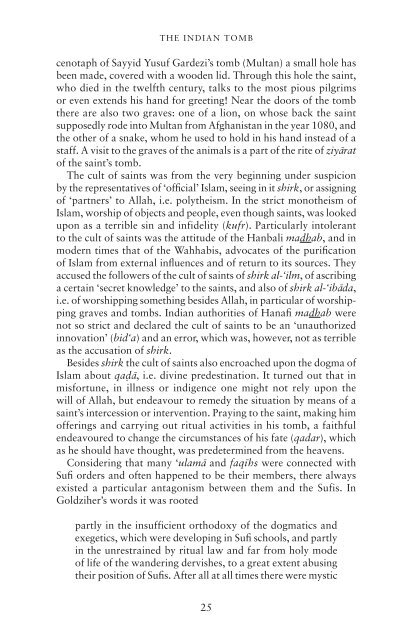Muslim Saints of South Asia: The eleventh to ... - blog blog blog
Muslim Saints of South Asia: The eleventh to ... - blog blog blog
Muslim Saints of South Asia: The eleventh to ... - blog blog blog
Create successful ePaper yourself
Turn your PDF publications into a flip-book with our unique Google optimized e-Paper software.
THE INDIAN TOMB<br />
cenotaph <strong>of</strong> Sayyid Yusuf Gardezi’s <strong>to</strong>mb (Multan) a small hole has<br />
been made, covered with a wooden lid. Through this hole the saint,<br />
who died in the twelfth century, talks <strong>to</strong> the most pious pilgrims<br />
or even extends his hand for greeting! Near the doors <strong>of</strong> the <strong>to</strong>mb<br />
there are also two graves: one <strong>of</strong> a lion, on whose back the saint<br />
supposedly rode in<strong>to</strong> Multan from Afghanistan in the year 1080, and<br />
the other <strong>of</strong> a snake, whom he used <strong>to</strong> hold in his hand instead <strong>of</strong> a<br />
staff. A visit <strong>to</strong> the graves <strong>of</strong> the animals is a part <strong>of</strong> the rite <strong>of</strong> ziyārat<br />
<strong>of</strong> the saint’s <strong>to</strong>mb.<br />
<strong>The</strong> cult <strong>of</strong> saints was from the very beginning under suspicion<br />
by the representatives <strong>of</strong> ‘<strong>of</strong>ficial’ Islam, seeing in it shirk, or assigning<br />
<strong>of</strong> ‘partners’ <strong>to</strong> Allah, i.e. polytheism. In the strict monotheism <strong>of</strong><br />
Islam, worship <strong>of</strong> objects and people, even though saints, was looked<br />
upon as a terrible sin and infidelity (kufr). Particularly in<strong>to</strong>lerant<br />
<strong>to</strong> the cult <strong>of</strong> saints was the attitude <strong>of</strong> the Hanbali madhab, and in<br />
modern times that <strong>of</strong> the Wahhabis, advocates <strong>of</strong> the purification<br />
<strong>of</strong> Islam from external influences and <strong>of</strong> return <strong>to</strong> its sources. <strong>The</strong>y<br />
accused the followers <strong>of</strong> the cult <strong>of</strong> saints <strong>of</strong> shirk al-‘ilm, <strong>of</strong> ascribing<br />
a certain ‘secret knowledge’ <strong>to</strong> the saints, and also <strong>of</strong> shirk al-‘ibāda,<br />
i.e. <strong>of</strong> worshipping something besides Allah, in particular <strong>of</strong> worshipping<br />
graves and <strong>to</strong>mbs. Indian authorities <strong>of</strong> Hanafi madhab were<br />
not so strict and declared the cult <strong>of</strong> saints <strong>to</strong> be an ‘unauthorized<br />
innovation’ (bid‘a) and an error, which was, however, not as terrible<br />
as the accusation <strong>of</strong> shirk.<br />
Besides shirk the cult <strong>of</strong> saints also encroached upon the dogma <strong>of</strong><br />
Islam about qad˛ā, i.e. divine predestination. It turned out that in<br />
misfortune, in illness or indigence one might not rely upon the<br />
will <strong>of</strong> Allah, but endeavour <strong>to</strong> remedy the situation by means <strong>of</strong> a<br />
saint’s intercession or intervention. Praying <strong>to</strong> the saint, making him<br />
<strong>of</strong>ferings and carrying out ritual activities in his <strong>to</strong>mb, a faithful<br />
endeavoured <strong>to</strong> change the circumstances <strong>of</strong> his fate (qadar), which<br />
as he should have thought, was predetermined from the heavens.<br />
Considering that many ‘ulamā and faqīhs were connected with<br />
Sufi orders and <strong>of</strong>ten happened <strong>to</strong> be their members, there always<br />
existed a particular antagonism between them and the Sufis. In<br />
Goldziher’s words it was rooted<br />
partly in the insufficient orthodoxy <strong>of</strong> the dogmatics and<br />
exegetics, which were developing in Sufi schools, and partly<br />
in the unrestrained by ritual law and far from holy mode<br />
<strong>of</strong> life <strong>of</strong> the wandering dervishes, <strong>to</strong> a great extent abusing<br />
their position <strong>of</strong> Sufis. After all at all times there were mystic<br />
25


